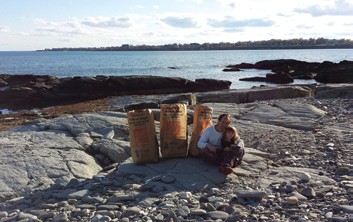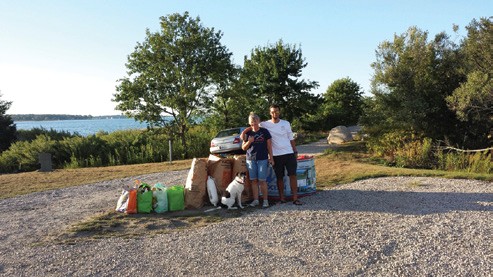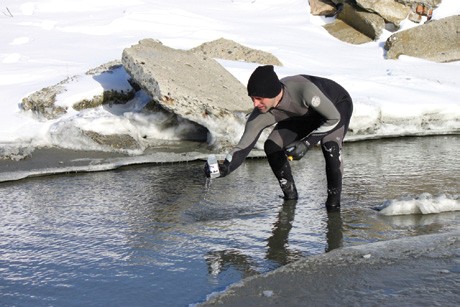By Dave McLaughlin
 I can still feel the emotions on a cold January evening in 2006 as we walked into the police station in Newport, Rhode Island, to share our concern about a parking issue along the Cliff Walk. People who care about shoreline access and water quality came together in the months that followed. It was hard to imagine that the concern would last more than one cycle of outrage and calls for action.
I can still feel the emotions on a cold January evening in 2006 as we walked into the police station in Newport, Rhode Island, to share our concern about a parking issue along the Cliff Walk. People who care about shoreline access and water quality came together in the months that followed. It was hard to imagine that the concern would last more than one cycle of outrage and calls for action.
Patrick Doyle and his daughter Holly removed some debris while monitoring shoreline access at Easton’s Point in Middletown, RI. “Volunteering gives me the ability to further this cause, maintain my connection to the ocean year-round, and share this wonderful connection with my daughter,” said Doyle. © Dave McLaughlin
The outrage was genuine: beaches were closed because of raw sewage spills, access to surf spots was in dispute, and we routinely stepped over garbage on our way to the water. The action was effective: we began testing the water, negotiating access, and organizing cleanups.
With over 4,200 people involved in one way or another since our first days, Clean Ocean Access has conducted over 153 coastal cleanups that removed 63,000 pounds of marine debris and shown quantifiable reduction in marine debris at some locations; collected over 4,200 water samples, tested for bacteria levels and alerted appropriate government agencies to any potential water quality issues; and protected 31 public rights-of-way in order to preserve and maintain public access to the shorelines. We’ve done a whole lot more; that’s just a snapshot!
Clean Ocean Access’ mission is “Action today so future generations can continue to enjoy ocean activities.” Our three core programs are strongly held together by community events:
1. Eliminating marine debris from the shoreline (CLEAN) and changing human behavior to improve ocean health;
2. Improving water quality (OCEAN) for permanent year-round clean water from healthy watersheds to marine ecosystems;
3. Working to protect, preserve, maintain, and expand shoreline access (ACCESS) for residents and visitors. While our focus is on Aquidneck Island’s three communities of Newport, Middletown and Portsmouth, our actions have had positive reverberations as far away as China.
Our 2015 goals are ambitious. As an official not-for-profit organization, we are looking to raise funds to pay our staff and increase our impact on the island.
CLEAN: Expand the Marine Debris Solutions Lifecycle Project with a focus on prevention (education and outreach) and partner with the Newport Maritime Alliance for the Newport Harbor Cleanup.
OCEAN: Expand our year-round weekly ocean and watershed quality monitoring, re-energize the Aquidneck Island Watershed Council, and work toward Green Infrastructure solutions.
ACCESS: Expand monitoring of public rights-of-way program to all of Aquidneck Island and help to lead the efforts of the Harbor Walk Commission to create an uninterrupted Harbor Walk. Most of all, we will strive to make sure that everyone on the island has an opportunity to be part of COA and that the volunteer activities are fun, easy, impactful, and rewarding.
 Clean Ocean Access is proud to be working with Sail Newport as a member of the Sustainability Subcommittee and an exhibitor in the Exploration Zone at the North American Stopover of the Volvo Ocean Race 2014-15. We are working on a massive marine debris removal effort at the Fort Adams waterfront so the entire venue is beautiful for the spectators and boats’ arrival.
Clean Ocean Access is proud to be working with Sail Newport as a member of the Sustainability Subcommittee and an exhibitor in the Exploration Zone at the North American Stopover of the Volvo Ocean Race 2014-15. We are working on a massive marine debris removal effort at the Fort Adams waterfront so the entire venue is beautiful for the spectators and boats’ arrival.
Rachel Bennett, her son Hayden, and Lucy at Pheasant Drive Beach in Portsmouth, RI. “I participate in beach cleanups because I feel very strongly about being environmentally responsible,” said Rachel. “With so many big problems in the world, this is one that everyone can do something about.” © Dave McLaughlin
The debris will be displayed in the Race Village, and afterwards we’ll implement the “leave no trace” protocol to make sure the entire coastline is pristine as we head into Memorial Day weekend.
The Sustainability Subcommittee is working to ensure our stopover is the most sustainable port of the global ocean race, with a mission of “environmental responsibility, on land and at sea.” We’re working to develop and implement a sustainability protocol that addresses resource efficiencies, education and outreach, climate and energy, and the marine environment. Activities include alternative transportation, biodiesel, emission inventory, recycling and composting, waste stream reduction, and a legacy project that is sure to be awesome.
The Volvo Ocean Race Exploration Zone, in the heart of the Newport Stopover Race Village, has interactive exhibits for all ages. The goal is to educate and inspire visitors about the sport of sailing and the ocean, and to discover continents and cultures around the world through the lens of the world’s most grueling sailboat race. More than 19 educational partners will have 24 exhibit themes including marine science, marine technology, geography and culture, sustainability and mathematics.
COA is honored to be a part of the Exploration Zone, and our exhibits will focus on Marine Debris Solutions, Habitat Conservation, and Healthy Watersheds. Marine Debris Solutions will present our comprehensive solution for removal (fixing the problems of the past) and prevention (via education and outreach) to improve ocean health. Habitat Conservation (thanks to our friends at Audubon Society of Rhode Island) is an obstacle course that is fun for all ages and will show you firsthand the challenges that wildlife face (habitat loss, invasive species, tall buildings and light pollution). The interactive Healthy Watershed model (with our partner Aquidneck Land Trust) shows the journey a drop of water takes from the sky to our reservoirs and oceans, how pollution becomes a problem, and how we should treat water that falls from the sky as a gift, something we need to protect forever.
 Our biggest accomplishment since 2006 is the building of friendships and positive energy throughout the entire community. We’ve seen that when people with the common focus of improving ocean health connect with nature by performing a beneficial activity, personal differences fade away. Momentum behind our theory of change continues to build. Making the right decisions for the environment is something we can do.
Our biggest accomplishment since 2006 is the building of friendships and positive energy throughout the entire community. We’ve seen that when people with the common focus of improving ocean health connect with nature by performing a beneficial activity, personal differences fade away. Momentum behind our theory of change continues to build. Making the right decisions for the environment is something we can do.
Kirk Vidotto monitors water quality at Easton’s Beach in Newport, RI. “Water testing is a simple way for me to help COA,” he said, “and it gives me a chance to be part of the message of instilling genuine concern and love of our local environment.” © Dave McLaughlin
We look forward to building partnerships with like-minded groups to further our collective mission of taking action today so future generations can continue to enjoy ocean activities. To get involved, email info@cleanoceanaccess.org or visit www.cleanoceanaccess.org and facebook.com/cleanoceanaccess.
Dave McLaughlin is the Co-Founder and Executive Director of Clean Ocean Access. An avid wave rider since 1983, he resides in Newport, RI.
